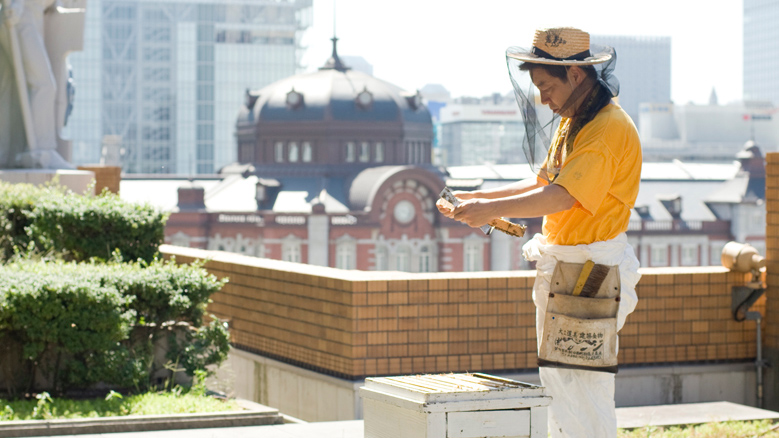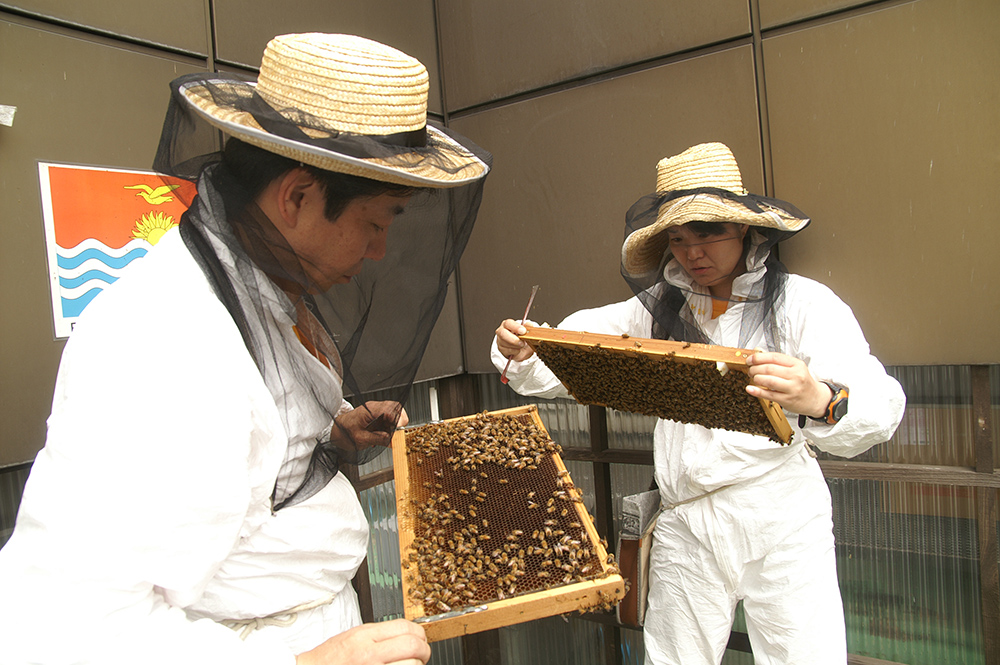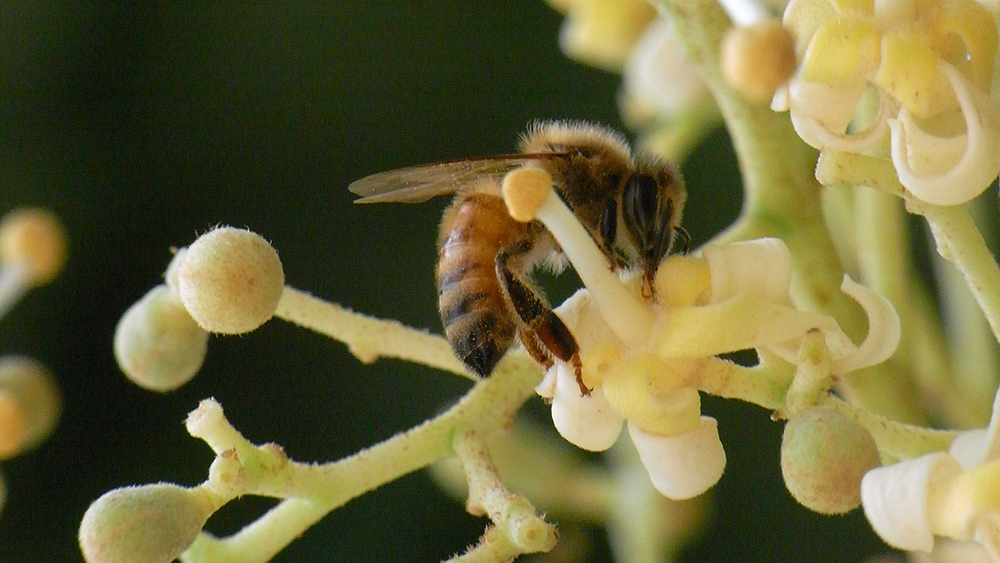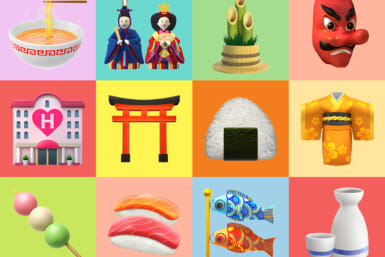If the founder of the Ginza Honey Bee Project has proved anything, it’s that just because we live in a concrete jungle, it doesn’t mean we can’t support the survival of the honey bees. Atsuo Tanaka tells us more about the success of the project, and how helping the bees in fact means helping ourselves.
To some, they are nothing more than a buzzing nuisance, but honey bees actually play a crucial role in producing almost 70 percent of the food that ends up on our plates. In addition to producing delicious honey, bees pollinate a vast majority of vegetables, crops and flowers, which in turn yield fruits that feed birds and other wildlife. Protecting the bees is not just a matter of insect conservation; it’s both an environmental and agricultural problem, it’s about protecting ecosystems and, ultimately, our entire food system.
Over the past few years you may have heard of the “global honey bee crisis,” but despite numerous reports and campaigns, the bee population has continued to decline. The cause of the crisis is still a point of contention, with beekeepers and environmental groups largely disagreeing with chemical manufacturers. But rather than one genesis, the most likely explanation for the decline is the nightmarish combination of pesticide use, climate change, mites, disease and the increasing lack of suitable environments to provide nectar (due to intensive farming and urban development).
In Japan, large areas of the country are occupied by manmade forests of non-nectar-producing cedar, cypress and pine trees, as well as rice paddies and farmland lacking the flowers and variety of plants that bees need to stay healthy. In addition, Japan is still one of the top pesticide users in the world. However, while their countryside counterparts are struggling, the city and suburban bees are doing better than ever. In Chuo Ward, high above luxury boutiques, upmarket restaurants and stylish bars, the Ginza Honey Bee Project (also known as Gin Pachi – combining the location with the Japanese word for “bee”) keeps bees on the rooftop of a high-rise building just a few minutes walk from the station.
When we meet with the project’s founder, Atsuo Tanaka, at first glance it’s hard to believe this well-dressed businessman is one of the most progressive beekeepers in the country. But within minutes, his passion and devotion for the project becomes clear. In the spring of 2006, after a chance encounter with a Tohoku beekeeper looking for roof space to rent in Tokyo, Tanaka offered his company’s rooftop, but somehow ended up becoming the beekeeper himself. “I’d never touched bees before; I didn’t know anything about beekeeping,” he says. “I grew up in a city and rarely had the chance to interact with nature when I was a child.”
As it turns out, the Chuo area is an urban paradise for honey bees who can go foraging for nectar in the flora of the nearby Imperial Palace, Hibiya Park and Hamarikyu Gardens as well as the flower pots and trees lining the elegant streets of Ginza. The bees then return to their rooftop home where volunteers harvest their honey, which is used to produce a number of products, including an array of honey-themed cakes, desserts and souvenirs baring the Gin Pachi mark. At certain times of the year, you can even hit nearby bars to sample Gin Pachi honey-based cocktails.

Tanaka’s business experience was likely an advantage in making connections with the local community and working with top patissiers, restaurateurs and barmen. He even convinced corporate CEOs to join him in harvesting sweet potatoes on his rooftop, and the geisha in Shimbashi to start growing rice. Earlier on the day we met, Tanaka had visited the Prime Minister’s house to tend to Akie Abe’s native Japanese honey bees – which are apparently very difficult to raise and vastly outnumbered by Western imports. The Prime Minister’s wife contacted the Ginza Honey Bee Project after returning from a trip to America where Michelle Obama had shown her how she was raising honey bees in the White House garden.
Education is also a huge part of the project, and Tanaka believes it’s most important to deliver the message to children as a part of environmental education. “Adults tend to think the bees are dangerous, but when the children are educated they teach the parents too. It’s a great strategy!” he says with a laugh. The mission of the project is not only to keep bees but to ask people to plant more trees and flowers all around the city. “Wherever it is, a school or a shopping street … when people pay attention to the environment around them, their perspective starts to change.” He continues, “People are apathetic; they should be more interested in the environment in front of them, not just concerned with animals in Africa or melting glaciers. Once they notice, it will help change society.”
Gin Pachi organises regular seminars and events, inviting regional famers and beekeeping groups to the city, exchanging skills, discussing problems and finding ways to collaborate while introducing regional produce and farming issues directly to city residents. “When you connect with people living in rural areas, your life in the city will come to feel more enjoyable,” says Tanaka. “What we eat is deeply connected to the people who harvest it … I’ve been able to connect with so many people from different regions.”
There are over 100 community beekeeping groups in Japan, over 40 of whom Tanaka has met with. Besides in Ginza, bees are collecting nectar in the most unexpected places, including Akasaka, Shibuya, Omiya, on top of the Marunouchi Building, at Oodori Park in Hokkaido, and even at Shurijo Castle in Okinawa. Groups are cropping up everywhere and the bees are living up to their role as pollinators – connecting people to each other.
In the 10 years since the project began, Tanaka’s life has been transformed by the bees. By understanding how they live, he has learned to appreciate the environment around him and become aware of various issues that different regions face. He hopes people living in the city will come to grow their own food, even just in small amounts, and by doing so, help farmers to solve their problems. One of the current aims is to make Gin Pachi products become popular souvenirs in time for the 2020 Olympics, a goal that could take this precious nectar, and its message, all around the world. As he connects the city to the countryside and spreads his mission beyond Ginza, Takana himself is performing his own kind of pollination.
A bee a cannot live alone: they always live collectively as a group. With a lifespan of only one to two months, bees are constantly busy – making honey, cleaning, warming their home, raising babies, and pushing out the dead, in a neverending cycle. Tanaka concludes: “They are very short-lived, so in that way, they are always living to connect their lives to another. I think we can learn a lot from them … you can make society better by connecting together and solving each other’s problems, like bees do.”

© Ginza Honey Bee Project NPO
How You Can Help
Here are a few simple tips for those who want to make a difference:
Plant more flowers and create green spaces for honey bees – in your yard, on your office roof, or even just by adding some plants to your balcony.
Try to buy organic, local produce and food from regional farmers. Supporting them directly helps to accelerate their projects and continue their positive work.
Educate yourself, your children, your friends, and spread the word. Apathy could be almost as deadly to the honey bees as pesticides.
Support the Ginza Honey Bee Project. You can arrange a tour of their rooftop beekeeping garden through their website, and find links of where to buy their products around Ginza. Look out for their special Christmas honey cake available only from Matsuya Ginza in December. For more information visit gin-pachi.jp.
Photos by Naoko Yamamoto









